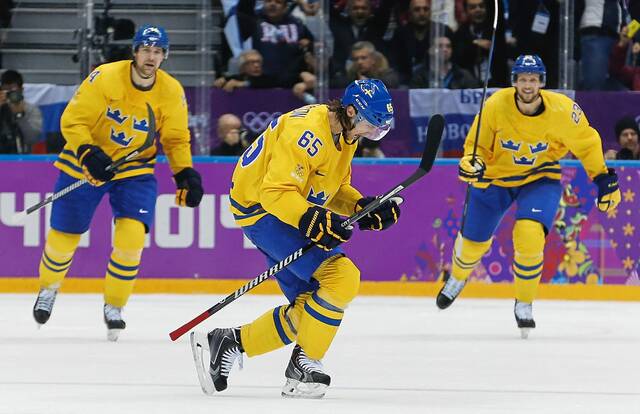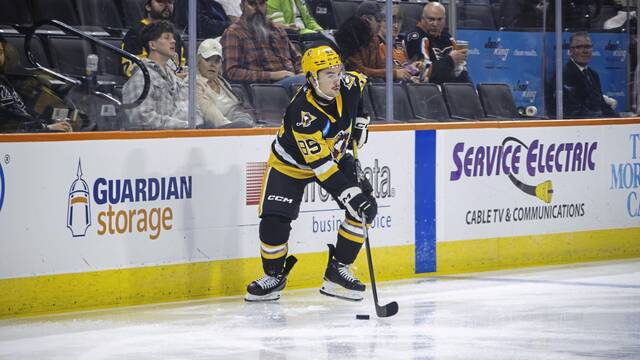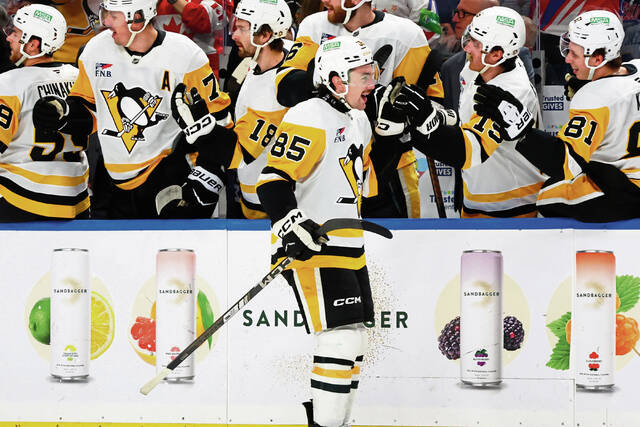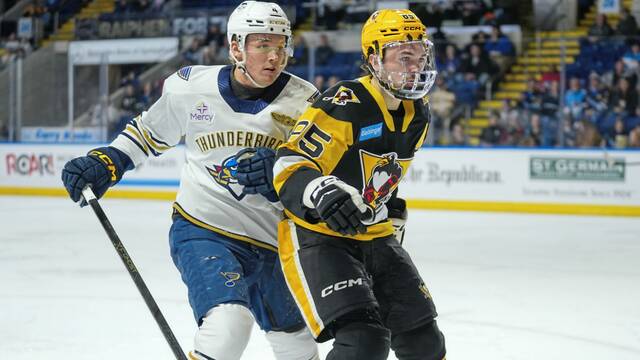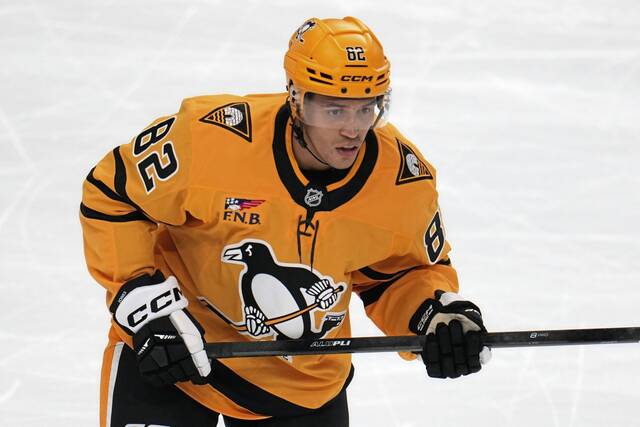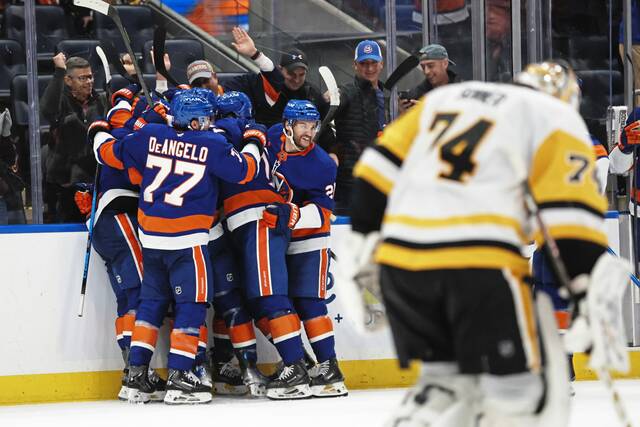While the NHL is on hold because of the ongoing coronavirus pandemic, the Tribune-Review will offer the Double Team project, an examination of the five best players who have contributed substantially to the Penguins and another franchise. For consideration, a player must have played at least the equivalent of a full season for each franchise. (Sorry, Jarome Iginla fans.)
Today, a look at the Chicago Blackhawks. As one of the so-called “original six” franchises, the Blackhawks entered the NHL in 1926 as the two-worded Black Hawks, named after a prominent member of the Sauk Nation. By 1986, the team name was shortened to one word. In 138 all-time meetings with the Blackhawks, the Penguins have a 45-31-22 record.
1. Ab McDonald, left winger
A member of three Stanley Cup-winning teams with the Montreal Canadiens dynasty of the late 1950s and early 1960s, McDonald was a two-time All-Star, primarily as a bottom-six forward, by the time he was traded to the ho-hum Black Hawks during the 1960 offseason.
The move turned out to be the best thing for McDonald’s career as it afforded him greater playing time and a far more prominent role than he could claim with the deep Canadiens. In Chicago, he formed the fleet “Scooter Line” with Stan Mikita and Ken Wharram. That trio boosted the Black Hawks to their third championship in 1961 with McDonald scoring the Stanley Cup-clinching goal in Game 6 of the Final against the Detroit Red Wings.
McDonald enjoyed four mostly productive seasons with the Black Hawks, reaching the 20-goal mark twice. After bouncing between the Boston Bruins and the Red Wings, McDonald was claimed by the Penguins in the 1967 expansion draft.
He only spent one season in Pittsburgh but it was a notable campaign as he served as the franchise’s first captain and led the team with 22 goals in 73 games. Despite that success, he was traded to the St. Louis Blues in the 1968 offseason.
2. Terry Ruskowski, center
A dominant player with the Houston Aeros and the Winnipeg Jets in the upstart World Hockey Association (WHA), Ruskowski joined Chicago following the 1979 merger between the NHL and WHA through an expansion draft that allowed incumbent NHL franchises to reclaim WHA players they still had rights to. In Ruskowski’s case, he was a fourth-round pick in 1974 by the Black Hawks.
As a first-year NHLer in 1979-80, Ruskowski teamed with Rich Preston (31 goals) and Grant Mulvey to form the productive “RPM Line.”
In 74 games, Ruskowski racked up a career-high 70 points. Additionally that season, Ruskowski took over as captain following the abrupt retirement of defenseman Keith Magnusson 12 games into the campaign due to a knee ailment.
Ruskowski never enjoyed the same level of success over the next three seasons and was traded to the Los Angeles Kings early into the 1982-83 campaign. Roughly three years later, he joined the Penguins as a free agent and found immediate success playing on the left wing of franchise center Mario Lemieux’s line. In 72 games during the 1985-86 campaign, Ruskowski posted 26 goals and 63 points.
After putting up 51 points in 70 games the following season, Ruskowski was on the move again joining the Minnesota North Stars in the 1987 offseason.
3. Michal Rozsival, defenseman
Perhaps the aptest description of Rozsival’s NHL existence is that he was a survivor. Despite some considerable injuries and his own shortcomings, he lasted an impressive 963 career games.
A fourth-round pick in 1996, Rozsival was one of the relatively few homegrown players the Penguins developed into an NHL talent during the late 1990s and early 2000s. Full of promise, Rozsival rarely lived up to it in Pittsburgh. A skilled puck mover, Rozsival could tease with a slick pass but more often than not, he frustrated with a turnover.
Furthermore, various ailments, including a serious knee injury that cost him all of 2003-04, hindered his tenure with the Penguins. Despite all of those impediments, he managed to appear in 237 career games for the Penguins and put up 65 points.
After playing in his native Czech Republic during the NHL’s lockout of 2004-05 lockout, Rozsival found much more success with his subsequent NHL stops as a member of the New York Rangers and Phoenix Coyotes.
His greatest triumph came as a member of the Blackhawks. Joining that team as a free agent in 2012, Rozsival carved out a regular spot in the lineup over five years when his body would allow him. Getting by more on guile than physical attributes, Rozsival offered a steady veteran presence on Chicago’s blue line and was a member of that franchise’s Stanley Cup championships in 2013 and 2015 before retiring due to more injuries in 2018.
4. Bob Kelly, left winger
In the 1970s, there were two Bob Kellys and each of them fought a bunch, even by the standards of the rough-and-tumble decade.
In order to distinguish them, the Kelly with the Flyers was given the nickname “Hound” by national reporters. Meanwhile, the Penguins’ Kelly got one of the greatest nicknames in all of sports: “Battleship.”
And boy, did he ever live up to that description.
Roundly considered the toughest player in franchise history, Kelly was, not coincidentally, one of the most popular players to ever wear a Penguins jersey due to his propensity to fight any willing combatant.
Kelly could play a little too. After joining the Penguins as a rookie via a trade with the Blues midway through the 1973-74 campaign, Kelly put up back-to-back 20-goal campaigns in 1974-75 and 1975-76.
By the 1977 offseason, Kelly was allowed to walk as a free agent and the Battleship docked in Chicago, joining the Blackhawks.
While he never reached the same level of success he enjoyed in Pittsburgh, Kelly lasted two seasons in Chicago with some bad teams, appearing in 138 games over that span before retiring by 1980.
5. Steve Sullivan, right winger
At 5-foot-9 and 165 pounds, Sullivan thrived during an era when guys his size weren’t supposed to be NHLers. While the vast majority of the league was big and physical, Sullivan carved out a fine existence as an undersized winger zipping around the sequoias on skates that populated NHL rinks throughout the late 1990s and early 2000s.
The Blackhawks claimed him off of waivers from the Maple Leafs and benefited immensely as Sullivan’s best hockey came in a Chicago jersey.
While the Blackhawks only reached the postseason once during his tenure with the team, Sullivan never scored fewer than 21 goals in his four full seasons in Chicago. His career season of 2000-01 saw him put up 34 goals and 75 assists.
With the Blackhawks embarking on a rebuilding project, Sullivan was dealt to the Nashville Predators at the 2004 trade deadline.
After recovering from a severe back injury that cost him parts of three seasons, Sullivan joined the Penguins as a free agent in 2011. Primarily used as a third-liner, Sullivan appeared in 79 games and put up 48 points for a playoff-caliber team before leaving as a free agent.
Honorable mentions: Lou Angotti, center; Marc Bergevin, defenseman; Olli Maatta, defenseman; Mike Stapleton, center; Dale Tallon, defenseman.



